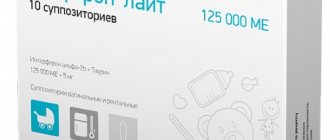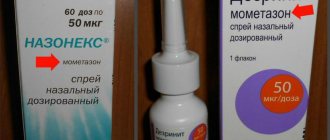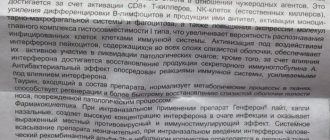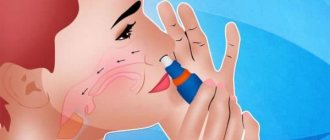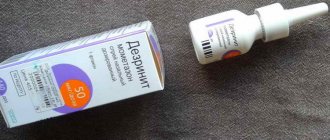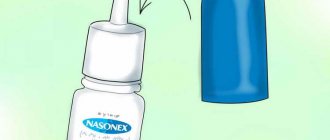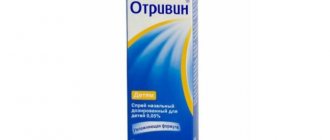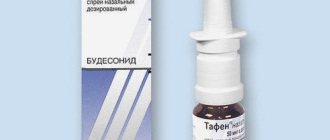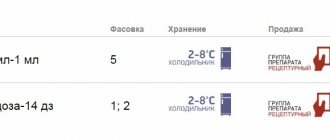Desrinit, 50 mcg/dose, 140 doses, metered nasal spray, 18 g, 1 pc.
When using mometasone for 12 months, there were no signs of atrophy of the nasal mucosa.
A study of biopsy samples of the nasal mucosa revealed that mometasone tended to normalize the histological picture.
When using the drug for a long time (as with any long-term treatment), periodic examination of the nasal mucosa by an otolaryngologist is necessary.
If a local fungal infection of the nose or pharynx develops, it is recommended to stop treatment with the drug and begin specific therapy.
Irritation of the mucous membrane of the nasal cavity and pharynx that persists for a long time is an indication for discontinuation of the drug. With long-term use of the drug, no signs of suppression of the function of the hypothalamic-pituitary-adrenal system were observed. Patients who switch to mometasone therapy after long-term treatment with systemic GCS require special attention. Withdrawal of systemic corticosteroids in such patients may lead to adrenal insufficiency, which may require appropriate measures. During the transition from treatment with systemic corticosteroids to mometasone therapy, some patients may experience withdrawal symptoms of systemic corticosteroids (for example, joint and/or muscle pain, fatigue, depression), despite a decrease in the severity of symptoms associated with damage to the nasal mucosa , such patients must be specifically convinced of the advisability of continuing treatment with Desrinit.
The transition from systemic corticosteroids to local corticosteroids may also reveal pre-existing allergic diseases, such as allergic conjunctivitis and eczema, that were masked by systemic corticosteroid therapy.
The effectiveness and safety of mometasone have not been studied in the treatment of unilateral polyps, polyps associated with cystic fibrosis, and polyps that completely occlude the nasal cavity. Unilateral polyps that are irregular in shape or bleeding should be further examined. Patients undergoing GCS therapy have a reduced immune reactivity and should be warned about the increased risk of infection when contacting patients with certain infectious diseases (for example, chicken pox, measles), as well as the need for medical consultation if such contact occurs.
With long-term use of nasal corticosteroids in high doses, systemic side effects may develop. The likelihood of developing these effects is much less than with the use of systemic corticosteroids and may vary in individual patients, as well as between different corticosteroids. Potential systemic effects include Cushing's syndrome, Cushingoid features, adrenal suppression, growth retardation in children and adolescents, cataracts, glaucoma, and less commonly, a number of psychological or behavioral effects including psychomotor hyperactivity, sleep disturbance, anxiety, depression, or aggression (especially in children). It is recommended to regularly monitor the growth of children receiving long-term therapy with mometasone. If growth slows, therapy should be reconsidered in order to reduce the dose of mometasone to the minimum effective dose to control the symptoms of the disease. In addition, the patient should be referred to a pediatrician for consultation. Treatment of GCS with higher doses than recommended may lead to clinically significant suppression of adrenal function. If high doses of corticosteroids are known to be used, the possibility of additional use of systemic corticosteroids should be considered during periods of stress or planned surgery.
Impact on the ability to drive vehicles and machinery.
No studies have been conducted to study the effect on the ability to drive vehicles and machinery.
Mechanism of action
All glucocorticoids, to which Desrinit belongs, help relieve the inflammatory process, eliminate toxins, reduce allergies and have an anti-shock effect. The composition of the medicine contains the main component - mometasone. It is effective for allergic type runny nose.
Dezrinit can also be used in the treatment of sinusitis and sinusitis, obstructive pulmonary diseases, and bronchial asthma. Moreover, in the latter case, the drug is prescribed in the form of inhalations. In other cases - locally, directly into the nasal cavity.
Positive dynamics can be seen within 12 hours after the first use . It is possible to stop lacrimation, sneezing and itching in the nasal cavity. The intensity of the cough reflex decreases, and signs of shortness of breath decrease.
How to give to children?
Desrinit must be used intranasally by spraying the spray into the nasal cavity .
Before the first use, you must perform 10 clicks to calibrate the product, and only then use the drug for therapy.
One click is 50 mcg of mometasone. If the product is not used for 2 years, the calibration must be repeated. Shake the bottle of medicine before each injection.
To treat seasonal or year-round runny nose, children over 12 years of age can use the medication 2 sprays into each nostril once a day. As soon as a positive result is achieved, reduce the dosage to 1 injection.
If rhinitis is severe or there is no positive dynamics , then the dosage may be exceeded and amount to 4 injections in each nasal passage. Patients from 2 to 11 years old use the product 1 injection into each nasal passage once a day. You can observe the positive effect after 12 hours.
For the treatment of acute sinusitis or chronic runny nose in the acute stage, children from 12 years of age use the drug 2 injections into each nostril.
General characteristics of the drug
Desrinit is a nasal spray, which is available in polyethylene bottles equipped with a dispenser. The main active ingredient is mometasone furoate monohydrate, a topical glucocorticosteroid. The drug also contains auxiliary components (polysorbate, citric acid monohydrate, etc.), but they do not have any effect on the course of the disease.
The liquid in the bottle with the medicine is milky in color and is presented as a homogeneous suspension. Vials containing 60 and 140 doses are available for purchase.
Price
Depending on the network of pharmacies, the location of the pharmacies, and the distance from large cities, the price of the spray may vary. So, in Moscow pharmacies the drug can be found for 340-400 rubles. In St. Petersburg, the product costs 350-380 rubles. In Nizhny Novgorod it will cost 400 rubles, and in Novosibirsk - 410-420 rubles.
The drug can also be ordered via the Internet with delivery; its cost will range from 350-400 rubles.
It is worth noting that analogues of the drug can cost 100-400 rubles more.
The product is sold strictly according to prescription.
We recommend that you read: Diavel for diabetes reviews
Indications for use
Prescribed in the following cases:
- allergic rhinitis in adults, including the elderly, as well as in children over 2 years of age;
- acute sinusitis;
- sinusitis with its exacerbation or acute sinusitis;
- nasal polyposis, only for adults over 18 years of age;
- prevention of rhinitis;
- therapy of bronchial asthma;
- chronic obstructive pulmonary disease.
When treated with the drug, symptoms such as nasal congestion, lacrimation, burning in the nose, and runny nose disappear. Breathing normalizes, cough and shortness of breath go away.
Possible harm
The use of Dezrinit is associated with a number of side effects, although in most cases the drug is well tolerated by patients.
The most common negative health manifestations are: headaches, nosebleeds, a burning sensation in the nasal cavity, and the formation of ulcers on the mucous membrane of the nasal passages.
Allergic reactions in the form of bronchospasm, shortness of breath, angioedema or anaphylactic shock are extremely rare. Rare side effects also include perforation of the nasal septum, irritation of the pharyngeal wall, distortion of the sense of smell and taste, increased intracranial pressure, cataracts or glaucoma.
Drug interactions
There are no data on the interaction of the drug with other drugs, since no studies have been conducted. It is known that the medicine does not interact with loratadine, therefore, while using the spray, the use of an antihistamine is allowed.
At the same time, it is not recommended to use several medications in the form of drops or sprays for the common cold at the same time. If treatment is carried out with two or more drugs in this form, you should wait an hour after using the drops before using another drug.
Contraindications
- Individual intolerance or hypersensitivity to any of the components, so carefully study the composition of the drug.
- The drug is not used in the presence of an infectious process with damage to the nasal mucosa.
- If a fungal infection is present that has not been treated or cured.
- Various nasal injuries or recent surgery. The drug is used after complete healing.
Use with extreme caution when:
- long-term treatment with the use of GCS drugs;
- identifying an infection, the treatment of which involves sanitizing the nasal cavity;
- active or latent tuberculosis of the respiratory tract.
In addition, the drug is not prescribed to children with year-round or seasonal rhinitis up to two years of age, with exacerbation of chronic and acute sinusitis up to 12 years of age, and for nasal polyposis, it is not prescribed to children under 18 years of age.
Use of the drug during pregnancy and breastfeeding
It is noted that the use of the drug during pregnancy and lactation is possible only when the importance of improving the health of the mother outweighs the risk of harm to the fetus or baby. In addition, infants whose mothers used corticosteroids should be examined for adrenal dysfunction.
Studies of the drug with mometasone during pregnancy and lactation have not been conducted.
Reviews about the product
On the Internet you can find almost positive reviews about the drug Dezrinit. It copes well with allergic rhinitis, is well tolerated and extremely rarely leads to the development of side symptoms. For young patients, it helps speed up recovery from adenoids and relieves inflammation.
Anna, 27 years old: “When the child was 2-3 years old, we were diagnosed with grade 2-3 adenoids.
What have we tried to treat this pathology? The drug Nasonex allowed us to ease our suffering. But it has one drawback - it is a high price - 1000 rubles. During the next examination, caused by an acute respiratory infection, I again went to the pharmacy, but instead of Nasonex they gave Dezrinit. This is an analogue that has anti-inflammatory and antiallergic effects. Its price is 450 rubles. Carrying out a comparative description of these two products, I realized that they act the same, but only the cost of Dezrinit is much lower. Thanks to him, the child’s snoring at night has decreased, and his nose breathes perfectly during the day.” Elizaveta, 41 years old: “I purchased Dezrinit spray to make my daughter’s breathing easier during treatment for her adenoids.
2 injections were performed in each nostril. I was able to see a positive result after 3 days. The nose began to breathe better, and the congestion completely disappeared. In addition, we managed to overcome night snoring, improve the child’s appetite and general condition.” Veronica, 32 years old: “Every spring, my son’s allergic rhinitis becomes more active. But we already know how to fight it with the help of Dezrinit. This drug has practically no drawbacks, because it is effective, inexpensive and does not cause side effects, at least we had none. Positive dynamics can be seen already 3-4 days after use. It is possible not only to facilitate nasal breathing, but also to relieve symptoms such as itching in the nose, sneezing, and reduce excessive mucus secretion.”
